Background
Michael Scammell was born on January 16, 1935, in Lyndhurst, Hampshire, United Kingdom.









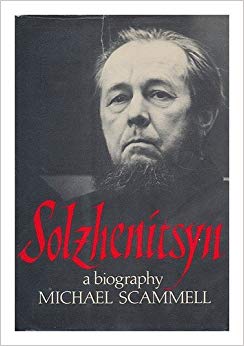
(Draws on new materials made available by the Solzhenitsyn...)
Draws on new materials made available by the Solzhenitsyn family and on interviews with the writer himself to create a profile of this complex personality and of the culture from which he emerged.
http://www.amazon.com/gp/product/0393018024/?tag=2022091-20
1984
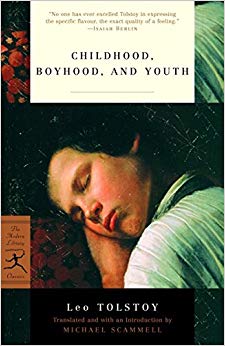
(Begun in 1851, when Tolstoy was twenty-three and serving ...)
Begun in 1851, when Tolstoy was twenty-three and serving as a cadet in the Russian army, Childhood, the first part of Tolstoy’s first novel, won immediate praise from Turgenev and others, and marked Tolstoy’s emergence as a major writer. Its originality was striking, as Tolstoy sought to communicate with great immediacy the “poetry” of childhood—the intense emotions, confusions, and fears attendant upon a young boy, Nikolenka, as he grows up. In the years following, Boyhood and Youth appeared (a fourth volume was planned but never executed), each replete with psychological and philosophical subtleties hitherto unknown in Russian literature. In Scammell’s resplendent translation, Childhood, Boyhood, and Youth remains one of Tolstoy’s major works.
http://www.amazon.com/gp/product/0375759441/?tag=2022091-20
2002
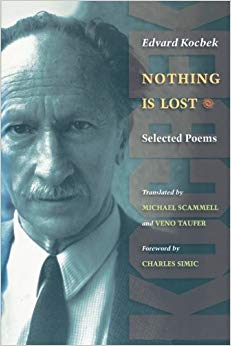
(This is the first comprehensive English-language collecti...)
This is the first comprehensive English-language collection of verse by the most celebrated Slovenian poet of modern times and one of Europe's most notable postwar poets, Edvard Kocbek (1904-1981). The selections introduce the reader to the full spectrum of Kocbek's long and distinguished career, starting with the pantheist and expressionist nature poems of his early period and continuing through the politically engaged poetry written during and after World War II, to the philosophical and metaphysical meditations of his fecund late period. Readers will be struck by the originality and freshness of Kocbek's sinewy and intense vision, rendered into fluid and idiomatic English by two experienced translators. The Slovenian texts appear on the facing pages. The opening stanza of "Moon with a Halo" ? The man beside me was killed. He had a mother who bore him and a father who made him toys, he had a brother and a playful uncle and a little girl with blond braids, he had a wooden cart and a wooden horse, a trunkful of coloured dreams and a brook where he used to fish.
http://www.amazon.com/gp/product/069111840X/?tag=2022091-20
2004
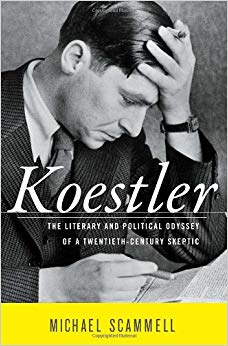
(From award-winning author Michael Scammell comes a monume...)
From award-winning author Michael Scammell comes a monumental achievement: the first authorized biography of Arthur Koestler, one of the most influential and controversial intellectuals of the twentieth century. Over a decade in the making, and based on new research and full access to its subject’s papers, Koestler is the definitive account of this fascinating and polarizing figure. Though best known as the creator of the classic anti-Communist novel Darkness at Noon, Koestler is here revealed as much more–a man whose personal life was as astonishing as his literary accomplishments. Koestler portrays the anguished youth of a boy raised in Budapest by a possessive and mercurial mother and an erratic father, marked for life by a forced operation performed without anesthesia when he was five, growing up feeling unloved and unprotected. Here is the young man whose experience of anti-Semitism and devotion to Zionism provoked him to move to Palestine; the foreign correspondent who risked his life from the North Pole to Franco’s Spain, where he was imprisoned and sentenced to death; the committed Communist for whom the brutal truth of Stalin’s show trials inspired the superb and angry novel that became an instant classic in 1940. Scammell also provides new details of Koestler’s amazing World War II adventures, including his escape from occupied France by joining the Foreign Legion and his bluffing his way illegally to England, where his controversial novel Arrival and Departure, published in 1943, was the first to portray Hitler’s Final Solution. Without sentimentality, Scammell explores Koestler’s turbulent private life: his drug use, his manic depression, the frenetic womanizing that doomed his three marriages and led to an accusation of rape that posthumously tainted his reputation, and his startling suicide while fatally ill in 1983–an act shared by his healthy third wife, Cynthia–rendered unforgettably as part of his dark and disturbing legacy. Featuring cameos of famous friends and colleagues including Langston Hughes, George Orwell, and Albert Camus, Koestler gives a full account of the author’s voluminous writings, making the case that the autobiographies and essays are fit to stand beside Darkness at Noon as works of lasting literary value. Koestler adds up to an indelible portrait of this brilliant, unpredictable, and talented writer, once memorably described as “one third blackguard, one third lunatic, and one third genius.”
http://www.amazon.com/gp/product/0394576306/?tag=2022091-20
2009
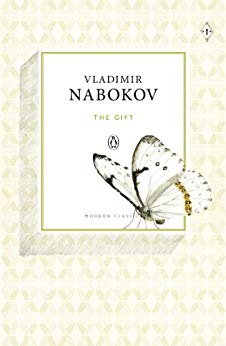
(The Gift is the phantasmal autobiography of Fyodor Goduno...)
The Gift is the phantasmal autobiography of Fyodor Godunov-Cherdynstev, a writer living in the closed world of Russian intellectuals in Berlin shortly after the First World War. This gorgeous tapestry of literature and butterflies tells the story of Fyodor's pursuits as a writer. Its heroine is not Fyodor's elusive and beloved Zina, however, but Russian prose and poetry themselves.
http://www.amazon.com/gp/product/B0071MZFYG/?tag=2022091-20
2012
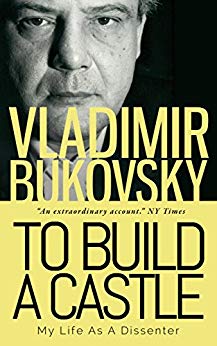
(A major document in the literature of human rights, this ...)
A major document in the literature of human rights, this now-legendary memoir, by one of the most prominent of the Soviet-era Russian dissidents, was a world-wide bestseller when first published in 1978. At the age of 20, as punishment for his political protests, Vladimir Bukovsky was falsely declared insane and committed to a psychiatric hospital--standard practice for communism's critics in 1963. But the quack doctors and brutal guards who kept him captive didn't realize: Bukovsky wasn't locked up with them. They were locked up with Bukovsky. In this compelling, beautifully-crafted memoir, Bukovsky details with equal parts burning outrage and bitter humor the cruel theater of life for Soviet prisoners of conscience. But he also recounts how he found his inner truth and strength, and built a fortress around it--the imaginary castle of the title--in which he could remain safe from the daily assaults on his body and mind. Bukovsky refused to break under the pressure of 12 years' incarceration in a series of psychiatric hospitals, labor camps, and some of the Soviet Union's worst prisons. More than that, though, he turned the tables on his captors and oppressors--the USSR under Brezhnev--with a series of rebellions, pranks, and persistent goading that ultimately led Soviet officials to trade him for a high-ranking Communist prisoner in the West, as a means of getting Vladimir Bukovsky out of the country at last. In To Build a Castle, Bukovsky offers powerful firsthand testimony to the importance of personal integrity and perseverance under seemingly boundless, endless oppression and abuse. Over nearly forty years, Bukovsky's story has inspired dissidents, prisoners, and those trapped by circumstance: Even in chains, you can be free. Masterfully translated from the Russian by Michael Scammell.
http://www.amazon.com/gp/product/B06XDSCM3B/?tag=2022091-20
2017
editor educator translator writer
Michael Scammell was born on January 16, 1935, in Lyndhurst, Hampshire, United Kingdom.
Scammel attended Brockenhurst Grammar School, and after two years was drafted into the British army. He was trained as a Russian interpreter. In 1958 he graduated with a Bachelor of Arts degree with first-class honours in Slavic Studies from the University of Nottingham. He also attended graduate school at Columbia University and later obtained his doctorate in Slavic Studies.
Scammell started his career working as a lecturer in English at Ljubljana University in 1958. Three years later he became a lecturer in Russian at Hunter College and began translating books from Russian. In 1962, he decided to work as a freelance writer. However, two years after moving back to England, he joined the External Services division of the BBC as a language supervisor for East European languages.
In 1971, Scammell became the first director of the nonprofit Writers and Scholars International (later the Writers and Scholars Educational Trust) in London and started the quarterly magazine, Index on Censorship. He worked as an editor there till 1980. During that time, in 1976, he also became a chair at International PEN, Writers in Prison Committee.
In 1985, Scammell returned to the United States to settle there permanently. From 1986 till 1994 he was a professor of Russian Literature at Cornell University, and in 1994 moved to Columbia University to become a professor of writing (nonfiction) and translation. He retired from Columbia at the end of 2011.
Now Scammell works as a freelance editor and writer.
Scammell has translated numerous books from Russian, including Crime and Punishment by Fyodor Dostoyevsky, Childhood, Boyhood and Youth by Lev Tolstoy, and memoirs by Soviet dissidents Anatoly Marchenko and Vladimir Bukovsky. He collaborated with Vladimir Nabokov in translating two of the latter’s novels, The Gift and The Defense, and has translated short stories and poetry from Serbo-Croatian and Slovenian, notably Nothing Is Lost, a book of selected poems by the Slovenian poet, Edvard Kocbek (Princeton University Press, 2004). He is also the editor of Russia’s Other Writers (Praeger, 1971), Unofficial Art from the Soviet Union (Secker and Warburg, 1977), and The Solzhenitsyn Files (edition q, 1995).
Scammell has also regularly contributed articles and criticism to the New York Review of Books, The New York Times Book Review, The Los Angeles Times Book Review, Harper’s, The New Republic, The Times Literary Supplement, The Observer, The Guardian, and other publications.
His latest work Koestler: The Indispensable Intellectual was widely acclaimed by critics on both sides of the Atlantic as a major literary biography and took a number of awards.
(Begun in 1851, when Tolstoy was twenty-three and serving ...)
2002(From award-winning author Michael Scammell comes a monume...)
2009(A major document in the literature of human rights, this ...)
2017(This is the first comprehensive English-language collecti...)
2004(Draws on new materials made available by the Solzhenitsyn...)
1984(The Gift is the phantasmal autobiography of Fyodor Goduno...)
2012(Reveals the Soviet government's files kept on the disside...)
1995Scammell was married to Erika Roettges, with whom he has four children, Catherine, Stephen, Lesley and Ingrid. After the marriage ended with a divorce, Scammell married Rosemary Nossiff.
